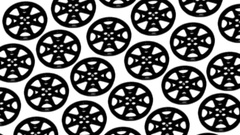Ossessione (1943)

Part of the Italian Neo Realism
| Director: | L. Vischonti |
|---|---|
| Certificate: | Unknown |
| Length: | |
| Format: | 35mm |
| Language: | |
| Country: |
Ossessione, L. Vischonti, Italy, 1943, 35mm, 140mins, 35mm, PG
"Ossessione", made in 1942 and banned in Italy by Mussolini, is a powerful delineation of the ill-fated love between Gino, a virile young drifter who arrives by chance at a roadside restaurant and filling station, and Giovanna, the beautiful young wife of the fat old man who owns the place. The two resort to drastic measures to stay together.
This film will also be screened on Sunday 14 January, 7.30pm
Check out more in our series of Italian Neo-Realist season:Voyage to Italy - Sunday 4 February, 7.30pmStromboli - Thursday 8 February, 8.10pm; Sunday 11 February, 7.30pmI Vitelloni - Sunday 18 February, 7.30pm; Thursday 22 Februray, 7.30pm
Other films in the Italian Neo Realism:

11
Film: Ossessione
11 Jan 2007, 8 p.m.
£3.50/3

08
Film: Stromboli (1950,)
8 Feb 2007, 8:10 p.m.
Our Italian Neo Realism Season continues with this classic from Rosselini.

11
Film: Stromboli (1950)
11 Feb 2007, 7:30 p.m.
Our Italian Neo Realism Season continues with this classic from Rosselini.

18
Film: I Vitelloni (1953)
18 Feb 2007, 7:30 p.m.
The grandfather of 'slacker' movies,(rough trans. 'The Guys') I Vitelloni (rough trans. 'The Guys') look at their elders, see the sterile results of lives rendered bereft by tradition and "sacrifice", and naturally rebel, searching in easy hedonism for the happiness that has eluded their parents. Fellini's semi-autobiographical, second feature, shares many of the neo-realist traits of his peers, but plays tricks with them too. A bit of a forgotten masterpiece.

22
Film: I Vitelloni (1953)
22 Feb 2007, 7:30 p.m.
The grandfather of 'slacker' movies,(rough trans. 'The Guys') I Vitelloni (rough trans. 'The Guys') look at their elders, see the sterile results of lives rendered bereft by tradition and "sacrifice", and naturally rebel, searching in easy hedonism for the happiness that has eluded their parents. Fellini's semi-autobiographical, second feature, shares many of the neo-realist traits of his peers, but plays tricks with them too. A bit of a forgotten masterpiece.


